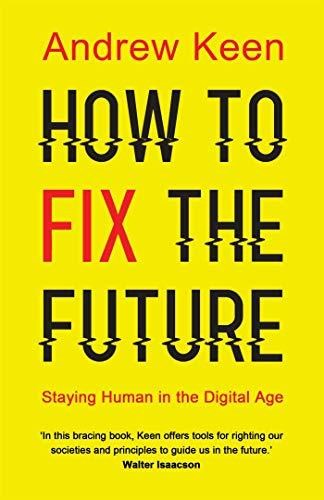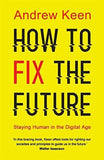FREE DELIVERY ON ORDERS OVER £25
ALWAYS UP TO 70% OFF RRP
SIGN UP FOR OFFERS AND EXCLUSIVES


How to Fix the Future: Staying Human in the Digital Age (Hardback)
Andrew Keen (Author)
- £5.00
-
£20.00 - £5.00
- Unit price
- per
Save £15.00
Please hurry! Only 45 left in stock
10 customers are viewing this product
Couldn't load pickup availability
Free Shipping
Free standard shipping on orders over £25
Same day dispatch.
Free Returns
Learn More.
- Publisher: Atlantic Books
- ISBN: 9781786491640
- Pages: 368
- Weight: 0.7
Andrew Keen is an Internet entrepreneur who founded Audiocafe.com in 1995 and built it into a popular first generation Internet company. He is currently the executive director of the Silicon Valley salon FutureCast, a Senior Fellow at CALinnovates, the host of the “Keen On” Techonomy chat show, and a columnist for CNN. He is the author of three books: CULT OF THE AMATEUR: How The Internet Is Killing Our Culture (2007), DIGITAL VERTIGO: How Today’s Social Revolution Is Dividing, Diminishing and Disorienting Us (2012) and INTERNET IS NOT THE ANSWER (2015).
Related Products
Example product title
- £5.00
-
£20.00 - £5.00
- Unit price
- per
Save £15.00
Example product title
- £5.00
-
£20.00 - £5.00
- Unit price
- per
Save £15.00
Example product title
- £5.00
-
£20.00 - £5.00
- Unit price
- per
Save £15.00
Example product title
- £5.00
-
£20.00 - £5.00
- Unit price
- per
Save £15.00
Example product title
- £5.00
-
£20.00 - £5.00
- Unit price
- per
Save £15.00
Example product title
- £5.00
-
£20.00 - £5.00
- Unit price
- per
Save £15.00
Example product title
- £5.00
-
£20.00 - £5.00
- Unit price
- per
Save £15.00
Example product title
- £5.00
-
£20.00 - £5.00
- Unit price
- per
Save £15.00
Example product title
- £5.00
-
£20.00 - £5.00
- Unit price
- per
Save £15.00
Example product title
- £5.00
-
£20.00 - £5.00
- Unit price
- per
Save £15.00
Recently Viewed Products
Example product title
- £5.00
-
£20.00 - £5.00
- Unit price
- per
Save £15.00
Example product title
- £5.00
-
£20.00 - £5.00
- Unit price
- per
Save £15.00
Example product title
- £5.00
-
£20.00 - £5.00
- Unit price
- per
Save £15.00
Example product title
- £5.00
-
£20.00 - £5.00
- Unit price
- per
Save £15.00
Example product title
- £5.00
-
£20.00 - £5.00
- Unit price
- per
Save £15.00
Example product title
- £5.00
-
£20.00 - £5.00
- Unit price
- per
Save £15.00
Example product title
- £5.00
-
£20.00 - £5.00
- Unit price
- per
Save £15.00
Example product title
- £5.00
-
£20.00 - £5.00
- Unit price
- per
Save £15.00
Example product title
- £5.00
-
£20.00 - £5.00
- Unit price
- per
Save £15.00
Example product title
- £5.00
-
£20.00 - £5.00
- Unit price
- per
Save £15.00
- Choosing a selection results in a full page refresh.


